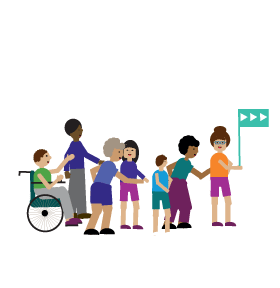- Staying well, connected to others and resilient
- Supporting people to contribute and do things they enjoy
Altogether Better Health services and local people find new ways of working together
Organisation
Altogether Better is an NHS national network organisation with a small core team and a wider group of associates, and a network approach used in over 100 GP practices.
Contact: altogether.better@swyt.nhs.uk or 01924 398428
SWYPFT, Fieldhead, Block 10, Room 29, Ouchthorpe Lane, Wakefield, WF1 3SP
What is the problem this innovation solves?
Health and social care services in the UK face high and increasing levels of demand. Often, people accessing services have physical and mental health needs that are not easily met by traditional models of care. Altogether Better’s model of collaborative practice frees up demand on health services, while providing the social support and connection people need to improve their own health.
Solution
By creating collaboration between people within the health service and people from local communities, we create a fresh new space where change can happen and lives and services can be improved. Our model of collaborative practice supports local people to become health champions, working alongside health professionals to reshape services. This opens up a range of new possibilities and helps services offer innovative activities and support.
By changing the nature of the service family, we change the culture of the organisation, creating new extended teams and reducing pressure on staff, while also making life better for everyone involved.
Evidence base
The Altogether Better model has been reviewed and researched in several different ways. Published research is available on our website and includes:
- Altogether Better Working Together to Create Healthier People and Communities – 2015.
- Evidence Summary: community health champions. South J, Raine G, Leeds Centre for Health Promotion Research.
- A qualitative analysis showing how health champions influence social capital in communities.
- A Social Return on Investment (SROI) analysis conducted by YHEC (York Health Economics Consortium). The analysis found that Altogether Better projects demonstrated a positive social return on investment of up to £112.42 for every pound invested.
- Against the Odds report. Health Foundation & Innovation Unit, January 2018.
Expected impact
The model is award-winning, and for good reason. It consistently leads to positive outcomes both for individuals and for services. Collaborative practice releases resources and creates capacity in the system, while providing the social support and connection individuals need to improve their own health. As a result, both services and people become more resilient, and everyone’s lives are improved.
The evidence from our whole system work shows that activities delivered by citizens and services working together in GP practices brought about better patient outcomes, increased resilience and ability to adapt, cope and live well with long-term conditions, as well as gaining a better understanding of how to use services.
We see significant improvements in mental health and wellbeing and overwhelming support from practice staff who sustain the work without our support:
- 94% of patients surveyed had improved mental health and wellbeing.
- 95% of staff surveyed recommend and want to continue after the funded period has ended.
- Improvements in staff morale, recruitment and retention.
- A new business model for general practice emerges.
“We have increased our patient lists by 4,500 people and seen no increase in demand for either primary or secondary care consultations because we do things differently.” Mev Forbes, Managing Partner, GP Surgery
Stage/spread (where it is/how much is there?)
Altogether Better began in 2008. The original community model engaged 18,000 health champions, who in turn reached over 105,000 people.
The collaborative practice model has since been introduced into over 100 GP practices across 23 clinical commissioning group (CCG) areas in the UK.
What would councils/health organisations/local areas need to do or have in place to enable it to happen?
The work requires a new set of skills when working at the boundary between the formal world of statutory organisations and the life world of citizens. Altogether Better have a diverse and expereinced team of people with a proven track record in organisational development and and systems change within primary care and in engaging active citizens. Our work is to support emergent leaders in general practice to develop a new way of working through a leadership approach which includes a leadership programme, mentoring and coaching to deliver a new model of care.
The work is most often commissioned at local level by councils, CCGs, accountable care organisations and practices themselves and is bespoke, designed through conversations with commissioners.
We have developed a process of engagement to ensure that commissioners and practitioners have a robust understanding of the work and clear planning processes to deliver time-bound work.
What would kill it?
For the model to work, both the local citizens and the clinicians and leaders in general practice need to be ready to try something new. It’s not enough for the CCG to want it to work – the people involved at practice level have to be open to learning a new way of working which will enable them to address the generators of demand, not the symptoms.
One of the things that can kill the work is if practices view this work as a gift of a group of champions. The huge benefits which come from this work happen when the practice understands that the work is collaborative – when the practice and champions work together to deliver new possibilities.
Where to go for more information
- Website: www.altogetherbetter.org.uk
- Email: altogether.better@swyt.nhs.uk
- Chat to a senior member of the team – telephone: 01924 316394

